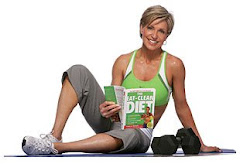
Metabolic syndrome AKA Syndrome X is a combination or grouping of cardiac risk factors resulting from insulin resistance (when the body’s tissues do not react normally to insulin). A person with metabolic syndrome has a much higher risk of cardiovascular disease and premature death. How would you like to be told that? I was. Lovely.
The most common fat distribution with this syndrome is the apple shape with upper body fat including a waist that pretty much equals hips and chest. A tube. That was me two years ago. Sitting on a time bomb perhaps.
The main causing factors are obesity with aging. Waist circumference is noted to be a significant factor which indicates visceral fat (fat around your organs including fatty liver – which is pre-cirrhosis really). Research studies observed that upper body obesity appeared to predispose to diabetes, atherosclerosis, gout and calculi (stones).
Interesting note: overweight horses can also get this syndrome known as ‘equine metabolic syndrome’ So if you have a horse and can’t get the saddle around the waist – be highly suspicious of weight gain and metabolic syndrome ;)
It is a syndrome of obesity with diabetes or pre-diabetes and insulin resistance, hypertension (high blood pressure) and high ‘bad’ cholesterol , blood clotting and lipid abnormalities.
The World Health Organization Clinical Criteria for Metabolic syndrome is:
Insulin resistance, identified by 1 of the following:
• Type 2 diabetes
• Impaired fasting glucose
• Impaired glucose tolerance
• or for those with normal fasting glucose levels (<110>
Plus any 2 of the following:
• Antihypertensive medication and/or high blood pressure 140 mm Hg systolic or >90 mm Hg diastolic)
• Plasma triglycerides >150 mg/dL =>1.7 mmol/L)
• HDL cholesterol <35>30 kg/m2 and/or waist:hip ratio >0.9 in men, >0.85 in women
• Urinary albumin excretion rate =>20 µg/min or albumin:creatinine ratio =>30 mg/g
Increased waist circumference may be a warning to check for the syndrome but remember that even slimmer women can have insulin resistance (these are most likely the 'fat-thin' people whose ratio of body fat to lean muscle is high).
This syndrome can be prevented and reversed. When we eat foods high in refined carbohydrates insulin levels surge to remove the sugar from the blood and to get it into the cells. For a period of time it works, but if your insulin spikes too often from a diet rich in high carb foods, particularly simple carbs, that cause excess insulin secretion, your cells respond by decreasing their reactivity and reduce the # of insulin receptors on the cell surfaces. This eventually prevents sufficient glucose from getting into the cells and allows more to stay in the blood resulting in high blood sugar. Basically cells are not able to receive enough glucose for energy which they need to function adequately.
Many women with insulin resistance have carbohydrate craving, fatigue, and weight gain. Fatigue because the cells are starving for energy because as mentioned they cannot get enough glucose; craving because your body is trying to get more carbohydrates for energy and weight gain because the sugar is not able to be adequately be utilized and is stored as fat. As you can see by the diagram at the top - it creates a cycle. This is an oversimplification but you get the picture.
Eventually the capacity to generate insulin properly is taxed and leads to type 2 diabetes. Insulin resistance is a major factor in metabolic syndrome.
Why is this happening?
In ancient times our ancestors were hunters and gatherers obtaining and eating whole foods and getting lots of exercise in the process of daily living and survival.
I for one sit on my butt all day and I was used to grabbing whatever I could eat, wherever I could - at fast food places or grazing around the office eating refined carbohydrates, preservatives pesticides, trans fats, toxins, and high fructose sugars. No wonder my insulin manufacturing system was wearing out.
Treatment
Can you reverse this trend?
Absolutely!
You are not going to do it with drugs or surgery though. You are going to do it much more naturally. (But please do not discontinue any medications without consulting your doctor. Once you reverse the condition your testing will reveal that you no longer need certain medications).
Earlier in this blog I mentioned when I was very obese I had this syndrome among other health concerns. I had tried reducing fat and sugar in my diet and took multiple mediations to control blood pressure, and cholesterol etc. The B/P meds ‘just’ kept my blood pressure at an acceptable level and though I tried every cholesterol medication available – they did not work.
One day when I went back for follow up for my high cholesterol, my doctor’s husband was covering (don’t worry he was also a doctor – at least I think so). He was not as nice as she was. He said there are no more medications to try. You are fat and you have to lose weight with nutrition and exercise. That is your only hope. Of course there was no advice offered by this lean runner on how an old fat woman should do this.
I tried but was so extremely short of breath when I did anything and had pain, was dizzy, felt faint and had a rapid heart rate. I was then put through a battery of tests which tied me up in the bottle necked health care system for two years. In the end I was just fat.
I tried for several years trying to lose weight by slowly increasing my activity and watching my nutrition and in the midst of it all I broke my ankle and was non-weight bearing for 5 months. I reached my heaviest weight ever. No surprise.
I finally hired a personal trainer to lead me through the maze of fitness information. With extreme determination on my part and patience on the part of the PT I achieved miraculous results.
I learned more by copious reading and became a huge fan of the Eat Clean Diet books by Tosca Reno.
During the process I found out how carb sensitive I was. I made sure to decrease my carbs, make them complex carbs and always have them earlier in the day as well as fill up on fibrous carbs. Avoiding anything white such as starches – like potatoes, white rice, and sugar (just listen to Tosca on the subject of sugar !).
I discovered on the rare occasion that I had bread or flour products that wheat had been causing my irritable bowel symptoms all those years. TaDa! Epiphany.
I could go into great detail about topics such as the GI diet but have decided not to because it is actually a complex issue and theory which is often misunderstood even by fitness trainers. It is best to stay away from complicated diet theories.
The best way to eat for most people is - simply. Eat as close to the ancestors diet as possible - avoid processed foods, eat natural whole foods.
The most important features to healthy nutrition are: eat 6 smaller meals each day, eat a combination of lean protein, complex carbohydrates, healthy fats, fibrous carbohydrates and you can't go wrong.
Conclusion
You are on a great journey to a new healthy lifestyle. I have been on mine for at least two years and I am still enjoying my journey. I have essentially become a hunter gatherer again with good nutrition and exercise.
Nowhere in the plan did I have gastric stapling, bypass, bands, fad diets, packaged diet foods, diet shakes or diet drugs.
Do things that way and you will not be healthy, you will retain your bad habits and you will have an unhealthy weight loss where your skin will not keep up.
Do things naturally with nutrtion, cardio and resistance training, sensibly and gradually losing weight, and your skin will keep up – natural plastic surgery.
I no longer have syndrome X, metabolic syndrome or insulin resistance – whatever you want to call it. Everything is perfectly normal and healthy. I am not taking any medications.
But I stay this way by eating clean 90% of the time and making exercise a permanent part of my life.
If you reduce your weight to at least within 20% of your ideal body weight and incorporate at least 20 minutes of vigourous exercise per day into your lifestyle you can significantly reduce your risk factors.
The only other thing I have left to do, is coax the man of my dreams to eat clean too. It is a work in progress :)













Fantastic article Christine! Do you mind if I borrow this for my blog (with full credit & link to you of course)
ReplyDeleteHi Daniel
ReplyDeleteI would be delighted to share this with you! I am very grateful to qualified personal trainers like you for providing so much information to help me find health and for helping others to find a natural healthy way to lose weight.
Keep on posting. Here's to encouraging health and fitness one person at a time.
Christine
Thanks for the link
ReplyDeleteChristine
Hi Christine,
ReplyDeleteWarm greetings from Indonesia.
Thanks so much for the article. I am 35 years old and for years i have been trying to figure out what's wrong with me. Diets (from good to fad and bad), exercise, protein shake diets, you name it, i have tried nearly everything, but not successful.
I am currently seeing nutritionist who suspects that I might have insulin resistance. (not yet undergo the glucose test). It's frustrating sometimes to do nearly everything and the bulge or weight don't even move. But, reading your blog has given me another hope.
Thanks so much for this. I will return to read more.
Warm regards
Diella
I have been diaganosed with insulinresistance and for the last year and 1/2 have cut out most carbs mostly protein based diet and have lost NO WEIGHT, have tried excersizing more, fasting blood sugar 130 AC1 6.1 don't know what to do! Dr's say loose weight but I don't 5ft4 165! HELP!!!
ReplyDeleteHi
ReplyDeleteI have a lot of empathy for your situation. As you may be able to tell from this post and the whole blog..it is not easy to address your problem through this media.
I am only an expert on my own health challenges. I don't have the training or credentials to ethically guide you on your personal health issues. I can share my challenges through this blog and give you hope that there are solutions.
Although experts can be of help, I recommend self education and research in conjunction with expert advice. An informed patient is a smart patient.
Having said that, there are so many reasons that your weight loss plan may be failing that it would be unrealistic for me to guide you with such limited information.
During my journey I was meticulous about measuring and calculating food intake, calories/carbs/protein/fat and exercise because we always underestimate our food intake and overestimate our exercise level. You don't have be this exact forever, but you sure do until you start to see desired changes or when you notice things deteriorating again.
Until you keep an accurate food and exercise diary you have no idea how many times in a day you inadvertently eat or drink too many calories etc.
How do you know what to change if you can't identify what you are doing. It takes a 3500 calorie deficit to lose one pound whether the deficit is from less calories and/or more exercise.
You need to have a deficit and I don't mean starvation diets. Very basically knowing your BMR, how many calories you are eating and how many calories you burn you can calculate roughly if you are in a deficit..decreasing carbs and eating mostly protein does not mean you are in a calorie deficit. Get to know what the calorie/carb/protein/fat is for common foods.
And
Make sure you are not drinking your calories...stay with water and avoid other beverages until you get things figured out.
During my journey, I used a program called Do it and although it was time consuming at first, I put in all my recipes and common foods and could plan and follow a balanced nutrition plan.
Early on, I got assistance from a personal trainer who is a kinesiologist to learn the best fitness plan for my goals...along the way I became a sponge and learned a lot about fitness, exercise, and even body building.
A kinesiologist generally keeps up with the latest fitness research and can implement the best and plan for your health, ability and goals. You said "help" so that would be a good place to start.
You can also access these types of trainers online which may be more cost effective but perhaps at the beginning face to face assessment and training would be best.
I also got some good information on nutrition and weight training from Tosca Reno's eat clean diet series and exercise books as well as Oxygen Magazine to supplement my other research and knowledge.
There is a lot of information out there that can confuse and overwhelm a person, So while I recommend reading and educating oneself along the journey...getting help from a fitness expert at the beginning can go a long way to speed up weight loss, and improve health.
Doctors are not always the best source of fitness information because a) it is not covered in depth in medical school and b) they don't have the time to give the individual counselling you need. As you mentioned the doctor told you to lose weight but likely not how to lose weight.
I wish you the best and would like to hear how you are doing.